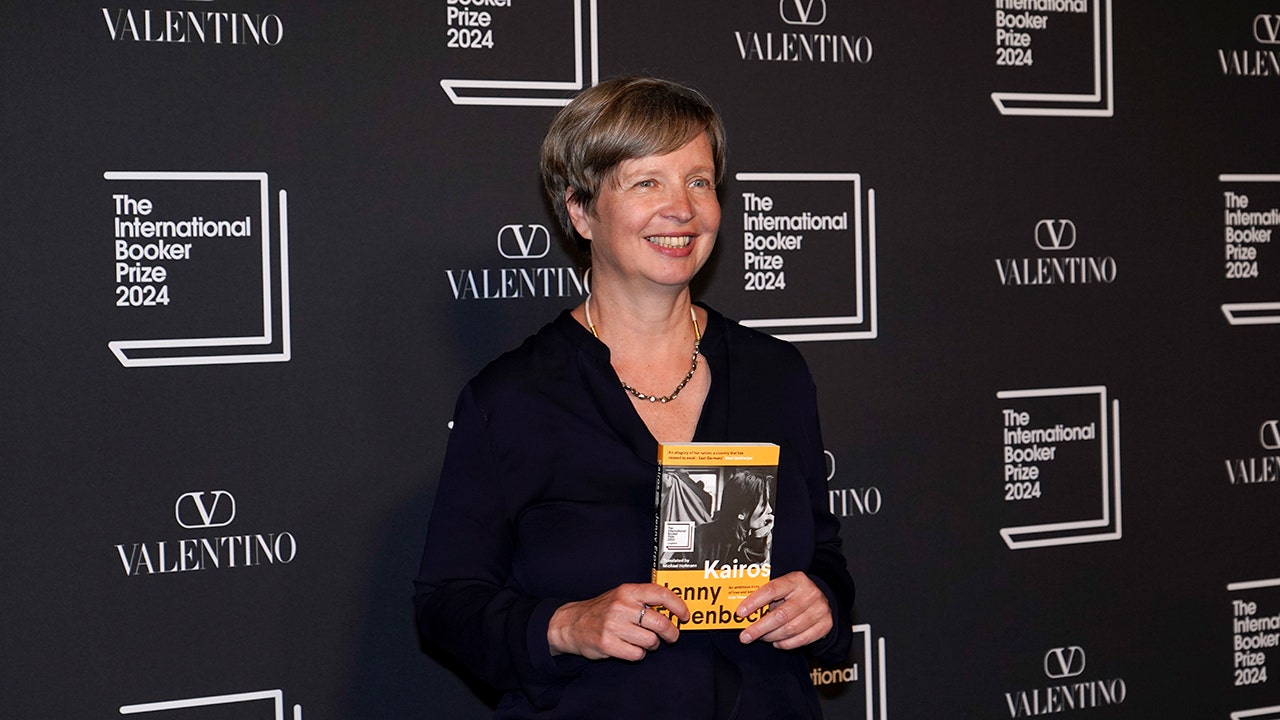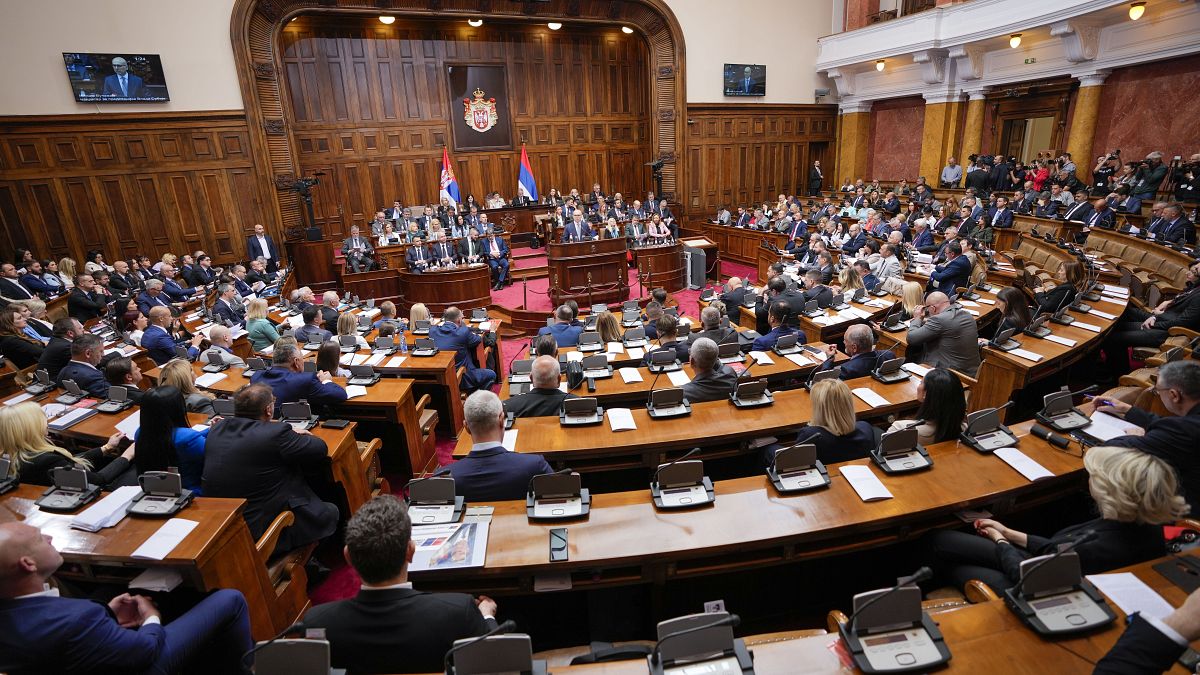World
House Republicans launch investigation into federal funding for universities amid campus protests
WASHINGTON (AP) — House Republicans on Tuesday announced an investigation into the federal funding for universities where students have protested the Israel-Hamas war, broadening a campaign that has placed heavy scrutiny on how presidents at the nation’s most prestigious colleges have dealt with reports of antisemitism on campus.
Several House committees will be tasked with a wide probe that ultimately threatens to withhold federal research grants and other government support to the universities, placing another pressure point on campus administrators who are struggling to manage pro-Palestine encampments, allegations of discrimination against Jewish students and questions of how they are integrating free speech and campus safety.
The House investigation follows several recent high-profile hearings that precipitated the resignations of presidents at Harvard and the University of Pennsylvania. And House Republicans promised more scrutiny, saying they were calling on the administrators of Yale, UCLA and the University of Michigan to testify next month.
“We will not allow antisemitism to thrive on campus, and we will hold these universities accountable for their failure to protect Jewish students on campus,” said House Speaker Mike Johnson at a news conference.
Nationwide, campus protesters have called for their institutions to cut financial ties to Israel and decried how thousands of civilians in Gaza have been killed by Israel following the deadly attack by Hamas on Oct. 7.
Some organizers have called for Hamas to violently seize Israeli territory and derided Zionism. Jewish students, meanwhile, have reported being targeted and say campus administrators have not done enough to protect them.
After Johnson visited Columbia last week with several other top House Republicans, he said “the anti-Jewish hatred was appalling.”
Republicans are also turning to the issue at a time when election season is fully underway and leadership needs a cause that unites them and divides Democrats. The House GOP’s impeachment inquiry into President Joe Biden has fallen flat and the Republican conference is smarting after a series of important bills left GOP lawmakers deeply divided. Democrats have feuded internally at times over the Israel-Hamas war and how campus administrators have handled the protests.
Senate Majority Leader Chuck Schumer, a New York Democrat, said in a floor speech Tuesday that it was “unacceptable when Jewish students are targeted for being Jewish, when protests exhibit verbal abuse, systemic intimidation, or glorification of the murderous and hateful Hamas or the violence of October 7th.”
Rep. Pete Aguilar, the No. 3 House Democrat, at a news conference Tuesday said that it was important for colleges “to ensure that everybody has an ability to protest and to make their voice heard but they have a responsibility to honor the safety of individuals.”
“For many of Jewish descent, they do not feel safe, and that is a real issue,” he said, but added that he wanted to allow university administrators to act before Congress stepped in.
But the Republican speaker promised to use “all the tools available” to push the universities. Johnson was joined by chairs for six committees with jurisdiction over a wide range of government programs, including National Science Foundation grants, health research grants, visas for international students and the tax code for nonprofit universities.
Without Democratic support in the divided Congress, it is not clear what legislative punishments House Republicans could actually implement. Any bills from the House would be unlikely to advance in the Democratic-controlled Senate.
But so far, the House hearings with university presidents have produced viral moments and given Republicans high-profile opportunities to denounce campuses as hotbeds of antisemitism. In December, the presidents of Ivy League universities struggled to answer pointed questions about whether “calling for the genocide of Jews” would violate each university’s code of conduct.
Rep. Elise Stefanik, the New York Republican who posed the question in the December hearing, said it became the highest-viewed congressional hearing in history. She also cast the campaign against antisemitism as part of a broader conservative push against what they say is overt liberal bias at elite American universities.
“Enough is enough,” she said. “It is time to restore law and order, academic integrity and moral decency to America’s higher education institutions.”
The House Committee on Education and the Workforce is also requesting that the administrators of Yale, UCLA and the University of Michigan appear at a hearing on May 23 that focuses on how they handled the recent protests.
“As Republican leaders, we have a clear message for mealy-mouthed, spineless leaders: Congress will not tolerate your dereliction of duty to your Jewish students,” said the committee chair, North Carolina Rep. Virginia Foxx.
At a hearing of the committee earlier this month, Columbia University’s president took a firm stance against antisemitism. But at the same time, a protest was underway on Columbia’s campus that would soon set off others like it nationwide. The university began suspending students this week in an attempt to clear the protest encampment on campus.
The university is also facing federal legal complaints. A class-action lawsuit on behalf of Jewish students alleges Columbia breached its contract by failing to maintain a safe learning environment.
Meanwhile, a legal group representing pro-Palestinian students is urging the U.S. Department of Education’s civil rights office to investigate whether Columbia’s treatment of the protesting students violated the Civil Rights Act of 1964.

World
Video: Israel Confiscates A.P.’s Camera Equipment, Shuts Down Live Feed

new video loaded: Israel Confiscates A.P.’s Camera Equipment, Shuts Down Live Feed
transcript
transcript
Israel Confiscates A.P.’s Camera Equipment, Shuts Down Live Feed
Israeli officials claimed The Associated Press had violated a new broadcasting law by providing images of northern Gaza to Al Jazeera, the pan-Arab broadcaster that the government voted to shut down.
-
Good luck. [microphone disconnects]
Recent episodes in Israel-Hamas War
World
German author Jenny Erpenbeck wins International Booker Prize for tale of tangled love affair

German author Jenny Erpenbeck and translator Michael Hofmann won the International Booker Prize for fiction on Tuesday for “Kairos,” the story of a tangled love affair during the final years of East Germany’s existence.
The novel beat five other finalists, chosen from 149 submitted novels, for the prize, which recognizes fiction from around the world that has been translated into English and published in the U.K. or Ireland. The 50,000 pounds ($64,000) in prize money is divided between author and translator.
COURT FINES GERMAN-TURKISH AUTHOR OVER ‘DEATH CAMP’ SPEECH
Canadian broadcaster Eleanor Wachtel, who chaired the five-member judging panel, said Erpenbeck’s novel about the relationship between a student and an older writer is “a richly textured evocation of a tormented love affair, the entanglement of personal and national transformations.”
Jenny Erpenbeck, author of Kairos, poses ahead of the International Booker Prize, in London, Tuesday, May 21, 2024. (AP Photo/Alberto Pezzali)
It’s set in the dying days of the German Democratic Republic, leading up to the fall of the Berlin Wall. Erpenbeck, 57, was born and raised in East Berlin, which was part of East Germany until the country disappeared with German reunification in 1990.
“Like the GDR, (the book) starts with optimism and trust, then unravels so badly,” Wachtel said.
She said Hofmann’s translation captures the “eloquence and eccentricities” of Erpenbeck’s prose.
The International Booker Prize is awarded every year. It is run alongside the Booker Prize for English-language fiction, which will be handed out in the fall.
Last year’s winner was another novel about communism and its legacy in Europe, “Time Shelter” by Bulgarian writer Georgi Gospodinov and translated by Angela Rodel.
The prize was set up to boost the profile of fiction in other languages — which accounts for only a small share of books published in Britain — and to salute the underappreciated work of literary translators.
Hoffman is the first male translator to win the International Booker Prize since it launched in its current form in 2016.
World
Serbian parliamentary minnow pushes for 'Russian law' equivalent

The proposed anti-foreign NGO law could bring more attention to the left-wing nationalist Movement of Socialists party, which currently has just two MPs in the 250-seat National Assembly.
Serbia’s Movement of Socialists party has announced it will draft a bill aiming to restrict the activities of foreign non-governmental organisations operating in the Balkan country.
The draft closely resembles the highly controversial law on foreign agents that is expected to be implemented in Georgia soon.
Defending the draft law, Movement of Socialists MP Bojan Torbica said, “Betraying one’s own country and people can no longer be a highly profitable activity.”
The proposed anti-foreign NGO law could bring more attention to the left-wing nationalist party, which currently has just two MPs in the 250-seat National Assembly.
“I really believe that it is a threat to the Republic of Serbia if there are NGOs that are donated from abroad and work here to propagate Kosovo as an independent state, to propagate the genocide in Srebrenica and the destruction of Republika Srpska,” said Đorđe Komlenski, parliamentary leader of the Movement of Socialists.
The three issues — two of which pertain to neighbouring Bosnia and Herzegovina — have been prominent talking points of nationalist politicians in Serbia ever since the disintegration of the former Yugoslavia and a series of bloody wars in the region in the 1990s.
While it is unclear whether Komlenski and Torbica alone can gather enough support to advance the law past the draft stage, civil society actors, such as the Youth Initiative for Human Rights, are concerned that the bill will impact Serbian society’s future.
Marko Milosavljević from Youth Initiative for Human Rights sees the move as a means of intimidating civil society and independent media.
“Through these announcements, we actually see the ban on the advocacy of certain democratic principles is kind of desireable,” Milosavljević said.
Serbian voters will go to the polls on 2 June to participate in a rerun of last year’s local election in 66 electoral units, including the capital, Belgrade.
The EU recently criticised Serbia, a candidate for EU membership, for not conducting free and fair elections, citing allegations of voter fraud.
-

 News1 week ago
News1 week agoSkeletal remains found almost 40 years ago identified as woman who disappeared in 1968
-

 World1 week ago
World1 week agoIndia Lok Sabha election 2024 Phase 4: Who votes and what’s at stake?
-

 World1 week ago
World1 week agoUkraine’s military chief admits ‘difficult situation’ in Kharkiv region
-

 Movie Reviews1 week ago
Movie Reviews1 week agoAavesham Movie Review
-

 News1 week ago
News1 week agoTrump, Reciting Songs And Praising Cannibals, Draws Yawns And Raises Eyebrows
-

 World1 week ago
World1 week agoCatalans vote in crucial regional election for the separatist movement
-

 Movie Reviews1 week ago
Movie Reviews1 week agoUnfrosted Movie Review: A sweet origins film which borders on the saccharine
-

 Politics1 week ago
Politics1 week agoNorth Dakota gov, former presidential candidate Doug Burgum front and center at Trump New Jersey rally

















